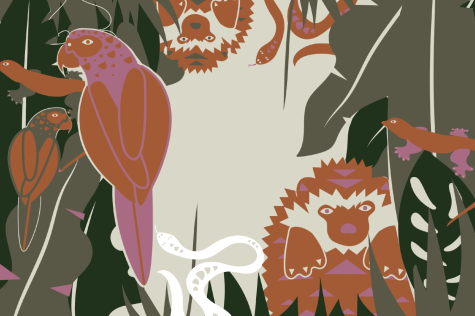Want a cuddly hedgehog or slithery snake? Read the instructions first
July 14, 2022

Editor’s note: This article is from the Communication Department’s award-winning Echo magazine.
When you hear the term “exotic pet,” you probably think of people who open up their home to monkeys, tigers and lions. However, you might be surprised to learn that pets found at your local pet store can also be considered exotic.
According to the Ecological Society of America, 50% of pets owned in the U.S. are considered exotic. Exotic animals require special care and are not for everyone, but many still pursue owning exotic animals like reptiles, which require paying special attention to their diet. Three-quarters of reptiles bought from a pet store die within the first year, according to World Animal Protection.
Many of the care instructions for exotic pets are not intuitive and require additional research. According to a guide from the Veterinary Centers of America Animal Hospital, snakes – which are cold blooded – need the choice of having two climates, meaning one side of the tank must be warmer than the other.
Some reptile owners love their pets so much they share them with the world. For instance, Nicole Lubecke, a Sedona, Arizona resident will stroll through a local shopping district with what looks like a white, scaly something around her neck. From a distance, it could be mistaken for an accessory. It’s not. It’s one of her many reptile pets.
Lubecke owns six snakes, one lizard and two dogs. She says the reptiles help ease the heartache of losing her brother in 2020; he loved reptiles and owned snakes, tarantulas and exotic fish, she says.
“After losing him, the snakes and reptiles remind me of him,” Lubecke says. “That’s where I find my comfort, especially my red-tailed boa, since he had one like her.”
Lubecke keeps the reptiles stored in a tank in a separate room of the house. Unlike her dogs or cats that need constant attention, Lubecke says her reptiles are more low maintenance, and she can leave them without being fed for six months at a time, as long as she leaves them with water.
According to the VCA Animal Hospital guide for feeding snakes, an owner should feed their snake depending on their size, age and activity level. The VCA also says a veterinarian can give a more precise feeding schedule based on each snake.
Exotic animals are not just unusual pets to own; for some people, they’re a source of income. The annual trading of exotic vertebrates equates to a multi-billion-dollar global business, according to the Ecological Society of America.
Jenna Perlick has been a hedgehog breeder for more than four years and owns a breeding company with her husband, Mathew Perlick, called Prickle Pack Hedgehogs, in Batavia, Illinois. Jenna saw a picture on a dating website of Mathew holding a hedgehog, and soon they were married and starting a business together.
The Perlicks have over 135 adult African hedgehogs in their garage.
“Hedgehogs are appropriate pets for some people,” Perlick said. “They are cute and cuddly on Instagram, but a lot of what you’re seeing is misinterpreted.” She adds that hedgehogs are also famous for pooping, a lot.
Hedgehogs can carry salmonella Typhimurium, but be asymptomatic and spread it to humans. According to Garden Wildlife Health, there have been rare instances of pets and livestock being infected by hedgehogs. In 2021, an outbreak of salmonella Typhimurium made 49 people in 25 states sick, and 83% of those infected reported having been in contact with a hedgehog beforehand, according to the Centers for Disease Control and Prevention.
Prickle Pack Hedgehogs aims to educate potential buyers about a hedgehog’s needs, and will take animals back if a buyer should change their mind.
It is important to research and learn proper care for an exotic animal before owning one. Hannah Good, veterinarian and owner of Community Mobile Vet in Santa Cruz, California, said that over her 30 years of practice she’s seen many examples of how an owner’s ignorance led to the neglect of an exotic pet.
For instance, Good has treated many parrots with fractured bones. The problem, she says, is that some owners feed their birds only birdseed, which doesn’t meet their need for calcium. Parrots need calcium to produce oil, which spreads through their feathers. If they do not get it naturally, their body starts draining calcium from the bones.
“Most people are horrified to find out that they were doing something wrong [to their exotic pet]. Over the years I’ve gotten much more gentle in my judgment and my approach to [owners],” Good says. “It’s usually just about ignorance.”
You can read the entire 2022 issue of Echo, as well as previous issues, on our website.







